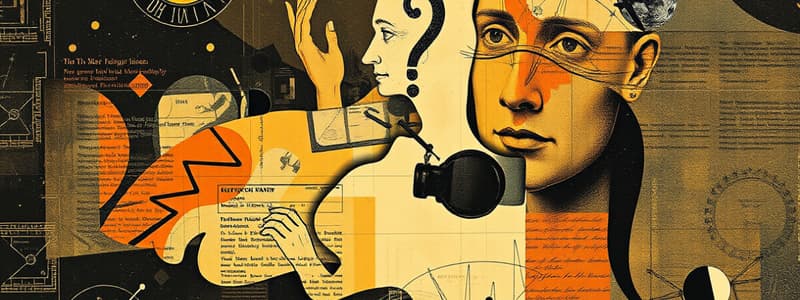Podcast
Questions and Answers
What is Jung's term for the unconscious of the individual?
What is Jung's term for the unconscious of the individual?
- Personal Unconscious (correct)
- Collective Unconscious
- Anima
- Shadow
Jung's term for the unconscious archetypes shared by all humans is?
Jung's term for the unconscious archetypes shared by all humans is?
- Collective Unconscious (correct)
- Personal Unconscious
- Shadow
- Archetypes
What are archetypes in Jungian psychology?
What are archetypes in Jungian psychology?
Unconscious psychic structures shared by all people.
What is the shadow archetype?
What is the shadow archetype?
Define Anima/Animus in Jungian theory.
Define Anima/Animus in Jungian theory.
What does the Self represent in Jungian theory?
What does the Self represent in Jungian theory?
What does a mandala symbolize in Jungian theory?
What does a mandala symbolize in Jungian theory?
What are ego functions?
What are ego functions?
In Jungian theory, what is the difference between thinking and feeling?
In Jungian theory, what is the difference between thinking and feeling?
Which of the following refers to the irrational functions in Jungian theory?
Which of the following refers to the irrational functions in Jungian theory?
What are judging versus perceiving in Jung's theories?
What are judging versus perceiving in Jung's theories?
What is the term 'individualization' in Jungian psychology?
What is the term 'individualization' in Jungian psychology?
Describe the Hero's Journey according to Joseph Campbell.
Describe the Hero's Journey according to Joseph Campbell.
What does synchronicity refer to?
What does synchronicity refer to?
What is an inferiority complex?
What is an inferiority complex?
Define 'compensate' in Adlerian psychology.
Define 'compensate' in Adlerian psychology.
What is meant by 'birth order' in Adler's psychology?
What is meant by 'birth order' in Adler's psychology?
Explain 'moving toward' in Adlerian theory.
Explain 'moving toward' in Adlerian theory.
What does 'moving against' refer to?
What does 'moving against' refer to?
What is 'moving away' in psychology?
What is 'moving away' in psychology?
What does Object Relations Theory provide?
What does Object Relations Theory provide?
What is Object Integration?
What is Object Integration?
Define a split-object image.
Define a split-object image.
What constitutes a basic fault in psychological terms?
What constitutes a basic fault in psychological terms?
What was Adler known for regarding the drive for power?
What was Adler known for regarding the drive for power?
Flashcards are hidden until you start studying
Study Notes
Jungian Concepts
- Personal Unconscious: The individual's unique unconscious mind, a reservoir of personal experiences and memories.
- Collective Unconscious: A universal aspect of the unconscious shared by all humans, containing archetypes that shape behavior and experiences.
- Archetypes: Fundamental psychic structures or symbols shared across cultures, reflecting universal themes in human experience.
- Shadow: Represents the darker aspects of the self, often repressed traits that can manifest in unexpected ways (e.g., Dr. Jekyll and Mr. Hyde).
- Anima/Animus: Represents the feminine side within men (anima) and the masculine side within women (animus), promoting psychological balance.
- Self: The central archetype in Jungian theory, symbolizing the totality of the psyche and the integration of unconscious and conscious aspects.
- Mandala: A symbolic representation of the Self, often depicted as a squared circle, signifying wholeness and balance.
Ego Functions and Personality Types
- Ego Functions: The mechanisms through which individuals perceive and interpret the world, foundational in personality assessment tools like MBTI.
- Thinking vs. Feeling: Rational functions differentiate between analytical thinking (focused on logic) and emotional response (focused on values and feelings).
- Intuition vs. Sensation: Contrasts how information is processed; intuition relates to abstract ideas and potential, while sensation relates to tangible experiences.
- Judging vs. Perceiving: Differentiates between those who prefer structure and planning (judging) versus those who embrace spontaneity and flexibility (perceiving).
Psychological Development and Theories
- Individualization: The process of psychological growth and self-development, emphasizing personal autonomy as one matures.
- Hero's Journey: Joseph Campbell's narrative framework that outlines the stages of personal growth and transformation, involving challenges and returns.
- Synchronicity: A concept describing meaningful coincidences where events are linked not by cause and effect but by symbolism.
Adlerian Psychology
- Inferiority Complex: A psychological condition where an individual feels inadequate or less worthy compared to others, stemming from perceived deficiencies.
- Compensate: The behavioral response to feelings of inferiority, often involving a pursuit of power or success to counteract self-doubt.
- Birth Order: A critical variable in Adler's theories, suggesting that the position of siblings within a family influences personality and behavior.
Coping Mechanisms
- Moving Toward: Strategies involving forming connections with others to reduce anxiety and foster security.
- Moving Against: An aggressive approach where individuals assert dominance over others to gain a sense of control.
- Moving Away: A defensive strategy focusing on withdrawal and avoidance of conflict to achieve personal peace.
Object Relations Theory
- Object Relations Theory: A framework for understanding personal relationships developed by examining how individuals perceive and engage with others.
- Object Integration: The process of forming a cohesive understanding of an internalized relationship, as opposed to fragmented or conflicting perceptions.
- Split-Object Image: A psychological tendency to view individuals in extreme terms, alternating between idealization and devaluation.
Developmental Issues
- Basic Fault: A critical issue arising from insufficient emotional connection during early childhood, potentially leading to difficulties in future relationships.
- Drive for Power: Central to Adler's psychological theory, emphasizing the importance of power dynamics in human interactions and personal motivation.
Studying That Suits You
Use AI to generate personalized quizzes and flashcards to suit your learning preferences.




